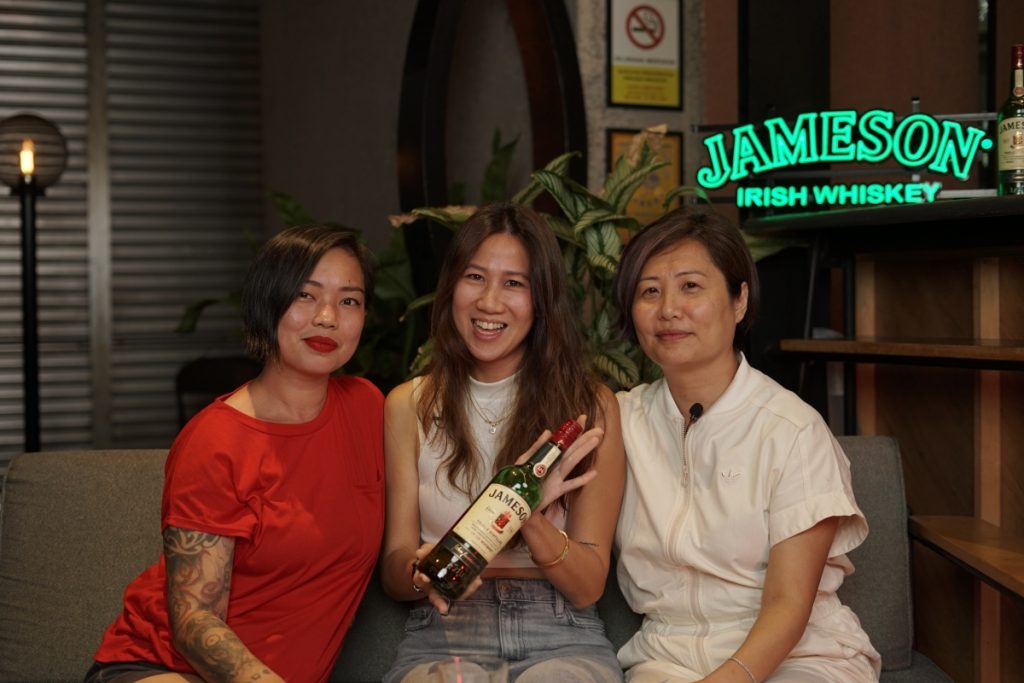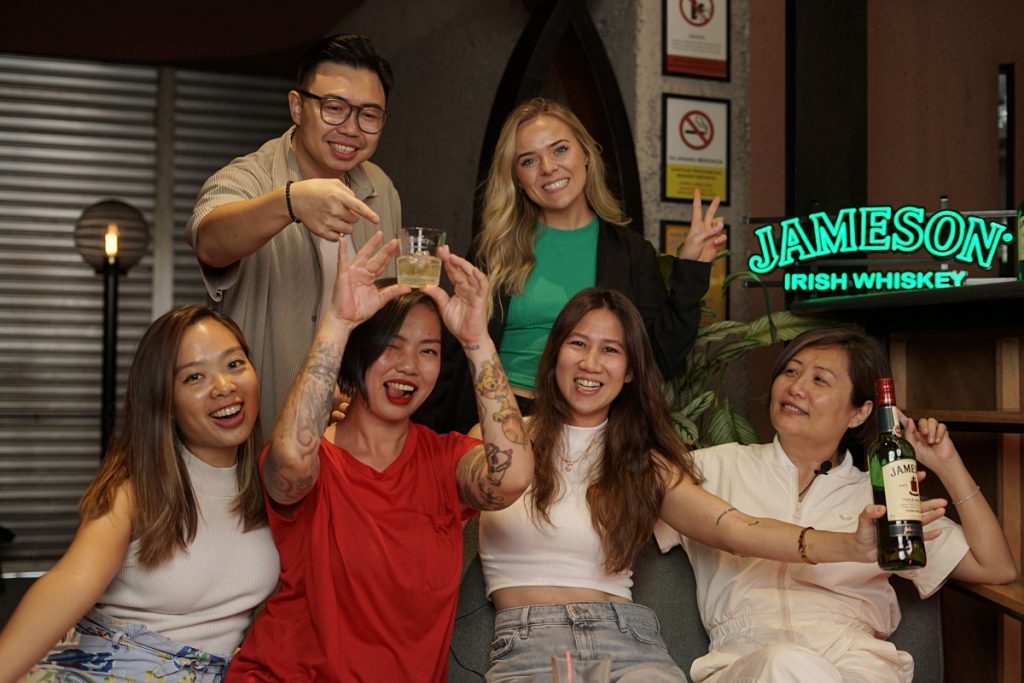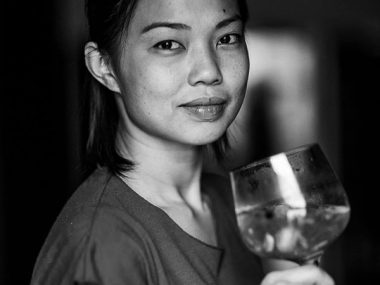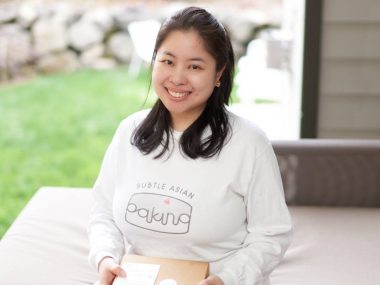For a myriad of reasons, the gender balance is still one that is unequal in the F&B industry. For an industry still riddled with staff shortages, March brings vital opportunities to get the conversation going on growing our industry into one that is welcoming, encouraging and inspiring to everyone. Thank you Jameson Irish Whiskey for making this episode possible.
In this conversation, we sat down (with drinks from Jameson Irish Whiskey, of course) with three leading female figures of the F&B industry in Malaysia in different roles – bartender, chef and owner-operator. Sitting on the panel were bartender Angel Ng, co-founder of bar community My Bartender’s Handshake, and The REX Bar, owner-operator Jenifer Kuah of Food Foundry, Alta Cafe, Studio Restaurant (previously known as Sitka Studio above Sitka Restaurant) and more, and Chef Jun Wong who previously helmed the kitchen of Kikubari.
Collectively, these remarkable women have over fifty years of experience having weathered through highs and lows throughout their careers. During these conversations, we explore how their journeys progressed over the years, how male colleagues play an important role in lessening the burdens women face in the industry, and sharing advice for any women who are considering a career in F&B. Here are a couple of highlights:
What was it like to be a woman in your role? How has the journey progressed for each of you – as a bartender, chef and operator?
Angel on the bartending scene in Malaysia: “We have made progress but not fast enough. the mentality years ago was that female bartenders were perceived to be escorts as well! We are now taken more seriously for our craft, which is a good progression but not fast enough.”
Jun reflected on being a chef during her early days: “If you have identical resumes, with everything being equal, the male would be good until proven otherwise, but the female will be a question mark until she proves herself. It still is happening (now), but the good thing is that we are seeing a lot more females in leading roles in the industry.”
Jenifer, who was previously a lawyer: “There were even fewer opportunities for women entrepreneurs in the F&B industry or the type of roles we could play in the industry fifteen years ago.”
Is it true, though, that this industry is mainly male-dominated?
Angel: “100%…100% male-dominated. When I first started out, I practised lifting a 22 L beer keg every day to prove myself. And we have to be ok if people called us bossy or cutthroat.”
Jun: “Where we lack in strength, we can compensate in brains. There is a change in the dynamics as you move up in the ranks as a female. A female is a near-zero threat in a junior position, but as you move up, the dynamic changes. We have to work harder, faster and stronger, to prove that we are not princesses in the kitchen.”
Jenifer: “I have one female chef out of ten. I think every industry is male-dominated. We have our strength that we should play to, instead of being like one of the guys. We are fighting many assumptions that make it hard for the younger female to participate in the industry.”
We have our strengths that we should play to, instead of being like one of the guys. A lot of our energy is not focused on the job, but other things…
Jenifer Kuah
How can male colleagues play a part in improving such issues?
Jenifer: “Teach your sons, for the next generation to step up.”
Angel: “Call it out. If you see a female customer being uncomfortable with a guy who is rude and loud, call him out.”
What do you wish to tell your male colleagues?
Jun: “Addressing upwards, I would say bosses have to be fair and provide equal opportunities and pay. Don’t hire a future female figure to represent your brand just because but choose us on a fair playground.”
“We want to be recognized for our abilities. Don’t hire a future female figure to represent your brand just because but choose us on a fair playground.”
Jun Wong
Angel: “We (females) need to learn how to ask, like asking for equal pay as our male counterparts.”
Jenifer: “To be constantly aware that such situations exist for women, do not assume that is being addressed. Guys, talk about it and be able to discuss issues with us.”

Work dynamics between females, competition vs collaboration? Which one is our industry leaning towards?
All agreed in unison:” There is not enough of us to compete. But if we collaborate on something, we would be very supportive of each other. There are still not many of us.”
Who has inspired you in your journey, and why?
Together: “Our mothers!”
Jenifer: “I had a lot of strong women role models not from the industry. My mum is one of them, and she always reminded me that girls could do anything (except that she was a little upset when I went into the F&B industry).”
Angel: “There are not enough female role models, but I got to give it to my mother. She is a dragon lady, and I have a lot of respect for what she does, despite our differences.”
Jun: “I personally never had any female mentors because it is so scarce, but I look up to people in the industry, like Dominique Crenn, the first female chef in the world who earned three-Michelin-stars for her restaurant Atelier Crenn in San Francisco. Again, I would go back to my mother because she is one heck of a kickass woman.”
What will you say to females starting out as chefs, bartenders, and potential restauranteurs?
Jenifer: “Be brave, take the leap. If you are moved to do it, you should just do it. Don’t listen to the naysayers.”
Jun: “In addressing the mental health issue in the industry, I would like to say that it is ok to be not ok. It is ok to make mistakes. If you figured out this is not the right job, you would still wake up tomorrow and go with it. Allow yourself to make mistakes.”
Angel: “It is ok to be thick skin and people call you bossy. Stay close to people who can take you as you are (and seriously). Together, you will achieve great things.”
Let’s talk about the future. What can the industry do to improve? How would you change if you could?
Jenifer: “I want my company to go on with the same philosophy that we have. I would like to have my company as the springboard for my team to progress forward in this industry. And to never stop working.”
Jun: “I wish for more humanity for the industry. The F&B sector played a crucial role in providing and donating food to people who needed it during the pandemic. I hope that people who receive that kindness show us the same kindness as well.”
If customers don’t treat us with more empathy and respect in ten years, that will be pretty depressing.
Angel Ng
Angel: “We know you (customers) are paying for your service, but we are not punching bags. All customers are right until they are abusive. Then, it is out the door”
Credits:

Sponsor: Jameson Irish Whiskey
Featuring: Angel Ng, Jenifer Kuah, Jun Wong
Hosts: Theri Burhan, Jason Soon
Editor and Writer: Theri Burhan
Videography & Production: Tan Production House









